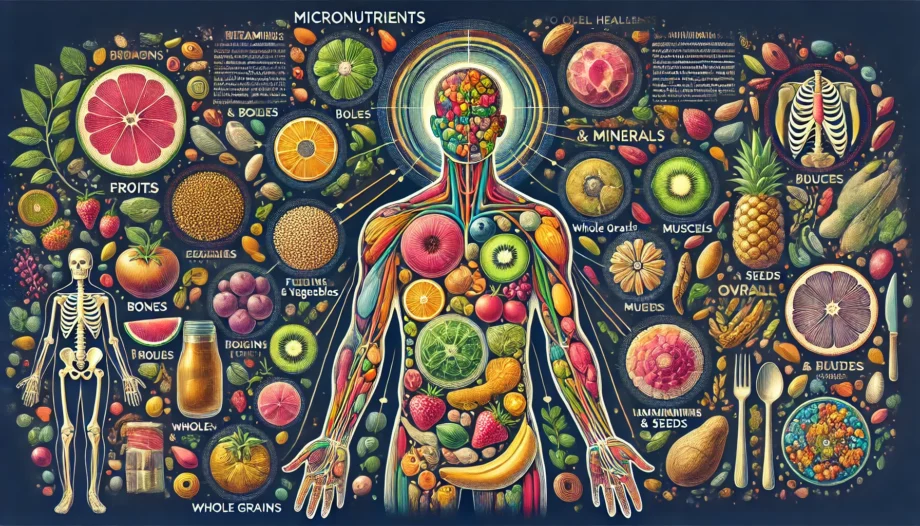When it comes to maintaining overall health, the spotlight often shines on macronutrients like carbohydrates, proteins, and fats. But what about the unsung heroes, the micronutrients? These tiny nutritional powerhouses play a vital role in our bodily functions, and understanding why are micronutrients essential for overall health can significantly improve your well-being.
What Are Micronutrients?
Before diving into their importance, let’s clarify what micronutrients are. Unlike macronutrients, which are needed in large amounts, micronutrients are vitamins and minerals required by the body in smaller quantities. Despite their size, they are crucial for various bodily functions including metabolism, immune function, and bone health.
The Role of Vitamins
Vitamins: The Essential Nutrients
Vitamins are organic compounds that our bodies need to function correctly. They are divided into two categories: fat-soluble and water-soluble. Each type plays distinct roles in maintaining health.
Fat-Soluble Vitamins
- Vitamin A: Important for vision, immune function, and skin health.
- Vitamin D: Crucial for bone health and immune response.
- Vitamin E: Acts as an antioxidant, protecting cells from damage.
- Vitamin K: Essential for blood clotting and bone metabolism.
Water-Soluble Vitamins
- Vitamin C: Important for the skin, bones, and connective tissue; also boosts the immune system.
- B Vitamins: A group of eight vitamins that play a role in energy production and the creation of red blood cells.
The Importance of Minerals
Minerals: The Building Blocks
Minerals are inorganic elements that our bodies need to grow, develop, and stay healthy. They are categorized into two types: macrominerals and trace minerals.
Macrominerals
- Calcium: Vital for strong bones and teeth, muscle function, and nerve signaling.
- Magnesium: Involved in over 300 biochemical reactions in the body, including muscle and nerve function, blood sugar control, and blood pressure regulation.
- Potassium: Crucial for muscle function, nerve signals, and fluid balance.
Trace Minerals
- Iron: Essential for the formation of hemoglobin, which carries oxygen in the blood.
- Zinc: Important for immune function, wound healing, and DNA synthesis.
- Selenium: Acts as an antioxidant and supports thyroid health.
Why Are Micronutrients Essential for Overall Health?
The Foundation of Wellness
Micronutrients might be needed in small amounts, but their impact on health is enormous. They are fundamental to various physiological processes that sustain life and health.
- Immune Support: Vitamins and minerals like Vitamin C, Vitamin D, and zinc bolster the immune system, helping the body fight off infections.
- Energy Production: B vitamins play a pivotal role in converting food into energy, keeping you active and alert throughout the day.
- Bone Health: Minerals such as calcium and Vitamin D are essential for maintaining strong and healthy bones, preventing conditions like osteoporosis.
- Antioxidant Protection: Vitamins like C and E act as antioxidants, protecting your cells from damage caused by free radicals, which can lead to chronic diseases.
Common Micronutrient Deficiencies
Recognizing the Signs
Despite their importance, many people suffer from micronutrient deficiencies, often without realizing it. Here are some common deficiencies and their symptoms:
- Iron Deficiency: Leads to anemia, causing fatigue, weakness, and pale skin.
- Vitamin D Deficiency: Results in bone pain and muscle weakness, and can lead to osteoporosis in severe cases.
- Vitamin B12 Deficiency: Causes fatigue, weakness, constipation, and neurological issues like numbness and tingling in the hands and feet.
How to Ensure Adequate Micronutrient Intake
Dietary Sources
To avoid deficiencies and maintain optimal health, it’s important to consume a varied diet rich in micronutrients. Here are some tips:
- Eat a Rainbow: Incorporate a variety of fruits and vegetables into your meals. Different colors often indicate different nutrients.
- Choose Whole Foods: Opt for whole grains, lean proteins, nuts, and seeds over processed foods.
- Consider Supplements: If you have dietary restrictions or specific health conditions, supplements can help fill in the gaps. However, it’s best to consult with a healthcare provider before starting any new supplement regimen.
Practical Tips for a Nutrient-Rich Diet
Meal Planning for Micronutrient Success
Creating balanced meals can ensure you’re getting a variety of micronutrients. Here are some practical tips:
- Breakfast: Start your day with a smoothie packed with fruits, leafy greens, and a scoop of yogurt or protein powder.
- Lunch: Build a colorful salad with mixed greens, colorful veggies, lean protein like chicken or tofu, and a handful of nuts or seeds.
- Dinner: Include a variety of vegetables, whole grains like quinoa or brown rice, and a source of healthy fats such as avocado or olive oil.
- Snacks: Keep nutrient-dense snacks on hand like fresh fruit, cut-up vegetables with hummus, or a handful of almonds.
The Impact of Lifestyle on Micronutrient Absorption
Factors Affecting Absorption
Your lifestyle can also impact how well your body absorbs and utilizes micronutrients. Here are some factors to consider:
- Hydration: Staying well-hydrated helps your body transport and absorb nutrients efficiently.
- Gut Health: A healthy gut microbiome is crucial for nutrient absorption. Consider incorporating probiotics and prebiotics into your diet.
- Physical Activity: Regular exercise enhances blood flow, which can improve nutrient delivery to your cells.
Conclusion: Embrace the Power of Micronutrients
Understanding why are micronutrients essential for overall health empowers you to make informed dietary choices that support your well-being. These tiny nutrients play a massive role in maintaining your health, from supporting your immune system to ensuring strong bones and providing antioxidant protection. By prioritizing a balanced, nutrient-rich diet and making mindful lifestyle choices, you can harness the power of micronutrients to enhance your health and vitality.

